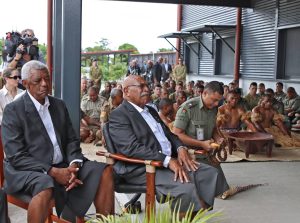Much has changed in the Pacific in the year since Solomon Islands signed a security agreement with China in April 2022. The benignly worded agreement sent shockwaves around the globe because it allows China immense opportunities to expand its military operations in the South Pacific. Future instabilities and domestic divisions in Solomon Islands, a nation plagued by violence and discord since its independence, now offer China a gateway to deploy military personnel and assets under the pretext of protecting people of Chinese heritage and Chinese investments in the island nation.
As recently as November 2021, people of Chinese descent and their businesses in the capital of Honiara were targeted by violent mobs who had initially gathered to protest Beijing’s grip on Solomon Islands’ political leadership. These events happened two years after Prime Minister Manasseh Sogavare switched his nation’s allegiance from Taiwan to the People’s Republic of China in late 2019.
In the wake of the China-Solomon Islands agreement, nations around the world have scrambled to reverse decades of inattention and lack of investment in the Pacific. Now the traffic of visits, meetings, opened checkbooks, and fast-tracked strategies to counter China’s influence in the Pacific have impacted nearly every Pacific nation or territory, island, and atoll in varying degrees. The substantial Pacific diaspora populations scattered mainly throughout Australia, New Zealand, and the United States have also received unprecedented attention over the past year. Their numerous challenges have become enveloped in new grand strategies all intended to “out-compete” China in the region.
The new attention and investment in the Pacific region has included the entry of new nations into the arena, like South Korea. These diplomatic and economic efforts to counter China have been accompanied by a huge upscaling of defense attention, not least through the AUKUS agreement between Australia, the United Kingdom, and the United States.
AUKUS and the China-Solomon Islands security agreement impacted the Pacific regionally and domestically. Fiji is no exception. The regional hub and focal point for a multitude of diplomatic, development, and relationship-building efforts, Fiji has undergone substantial change since its December 2022 national elections. The termination of Frank Bainimarama’s 16-year political dominance of Fiji and the systematic dismantling of his power base across the country has happened at a rapid pace since the new government was sworn in on December 24, 2022.
When Bainimarama grasped power in a 2006 military coup, his ostracism by Fiji’s traditional partners in Australia, New Zealand, and the United States was China’s great gain. Throughout Bainimarama’s authoritarian rule in Fiji, China built a foundation in the Pacific. Now his political demise has been a blow to China’s regional efforts to expand its influence.

































